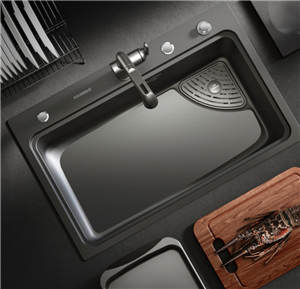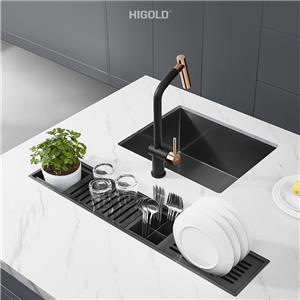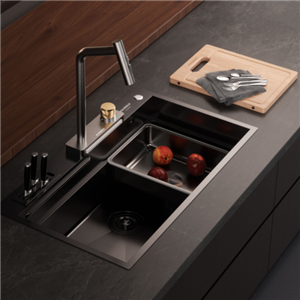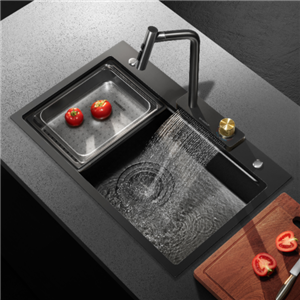What is the difference between 300 and 304 stainless steel sinks?
In modern kitchen design, stainless steel sinks are widely used in commercial kitchens and home kitchens. As a stainless steel material with high strength, corrosion resistance and aesthetics, its application in kitchen sinks has become the industry standard. However, in the selection of stainless steel sinks, different steel models and specifications directly affect the quality, durability and use experience of the sink. In particular, 300 series and 304 stainless steel, as the two most common materials on the market, are often confused by consumers.
So, what is the difference between 300 series and 304 stainless steel sinks? What are the differences in their advantages and disadvantages in actual use and application scenarios? This article will analyze these two stainless steel sinks in detail to help consumers make rational choices.
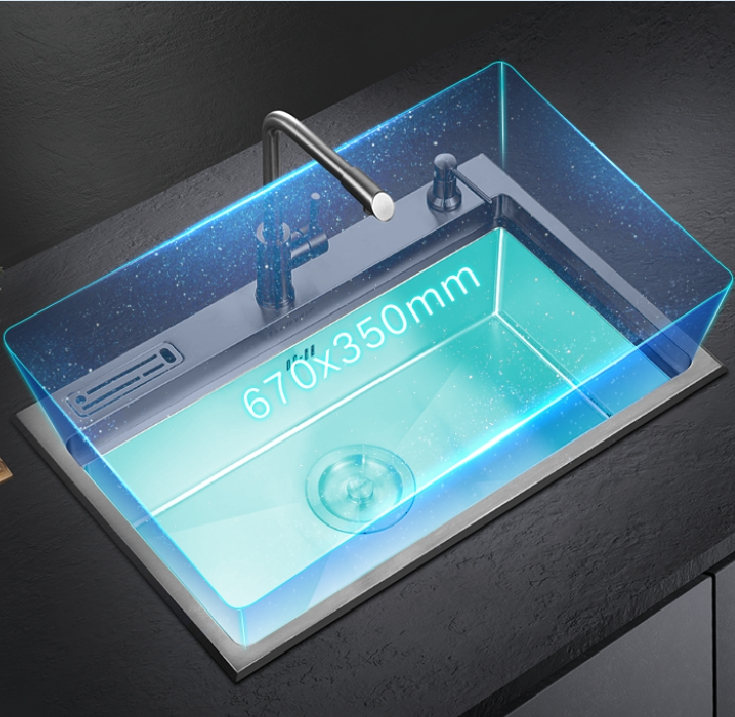
What is 300 series stainless steel?
300 series stainless steel refers to an austenitic stainless steel series containing 18% chromium and 8% nickel, commonly known as "18-8 stainless steel". It is a type of stainless steel material with good corrosion resistance and excellent forming properties. 300 series stainless steel is commonly used to manufacture various kitchen equipment, household appliances, automotive parts, and industrial equipment, etc.
There are many types of 300 series stainless steel, among which 304 stainless steel is the most common and widely used one. Due to its excellent corrosion resistance and processing performance, 304 stainless steel is often used to manufacture tableware, kitchen utensils, medical equipment and various high-precision industrial products.
What are the advantages of 304 stainless steel sinks?
304 stainless steel, as a representative material in the 300 series stainless steel, is widely used in kitchen sinks, kitchen equipment and various other commercial and household products. 304 stainless steel has the following outstanding characteristics and advantages:
1. Strong corrosion resistance
304 stainless steel exhibits excellent corrosion resistance in most home and commercial kitchen environments, especially for common kitchen pollutants such as water, oil, and salt. The chromium and nickel in its main components can effectively form a protective oxide film to prevent corrosion, so in humid, acidic or alkaline environments, 304 stainless steel sinks can maintain a long service life.
2. High temperature resistance
304 stainless steel can withstand high temperatures and can withstand high temperatures of up to 870°C for a short period of time, which makes it very suitable for use as kitchen sinks, cooking equipment, etc. 304 stainless steel sinks can provide stable and reliable performance for washing hot water, grease and high-temperature ingredients.
3. Easy to clean and maintain
The smooth surface of 304 stainless steel gives it good cleaning performance. Stains, oil stains and bacteria are difficult to adhere to its surface, so 304 stainless steel sinks are very easy to clean and maintain. Regular cleaning and maintenance can keep the sink beautiful.
4. Good mechanical properties
304 stainless steel has excellent ductility and strength. When it is processed into a sink, it can maintain its structural stability well. Even after long-term use, the shape of the 304 stainless steel sink is not easy to deform.
5. Non-toxic and safe
304 stainless steel does not contain harmful substances in its composition, so it is very suitable for food contact and meets national health standards. It will not produce substances harmful to the human body when it comes into contact with food and tableware.
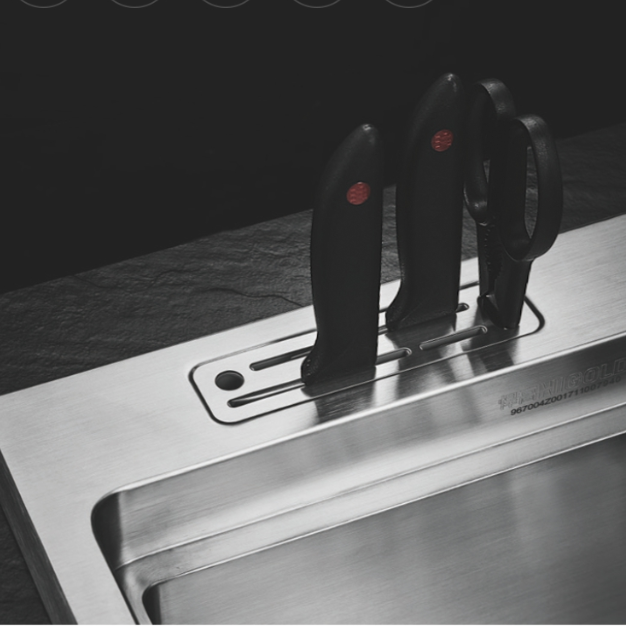
What are the other types of 300 series stainless steel?
In addition to 304 stainless steel, the 300 series also includes some other stainless steel materials, the most common of which are 301 stainless steel, 302 stainless steel, 303 stainless steel, etc. Although these stainless steel materials are also austenitic stainless steels, they have certain differences in composition and performance, especially in terms of corrosion resistance and mechanical strength.
1. 301 stainless steel
Compared to 304 stainless steel, 301 stainless steel has a slightly lower nickel content and is usually used in applications that require higher strength. 301 stainless steel has strong ductility and plasticity, and is suitable for some kitchen equipment with lower corrosion resistance requirements. Since it is not as corrosion-resistant as 304 stainless steel, it is not often used in sink manufacturing.
2. 302 stainless steel
302 stainless steel is very similar to 304 stainless steel in chemical composition, but it has a slightly higher nickel content, so it has improved corrosion resistance and heat resistance. 302 stainless steel is often used in some special kitchen equipment, but it is not as common as 304 stainless steel.
3. 303 stainless steel
Compared with 304 stainless steel, 303 stainless steel has an increased sulfur content, which improves its machinability during processing. Although 303 stainless steel has advantages in processing performance, its corrosion resistance is slightly inferior to 304, so it is not often used in places with high corrosion resistance requirements such as kitchen sinks.
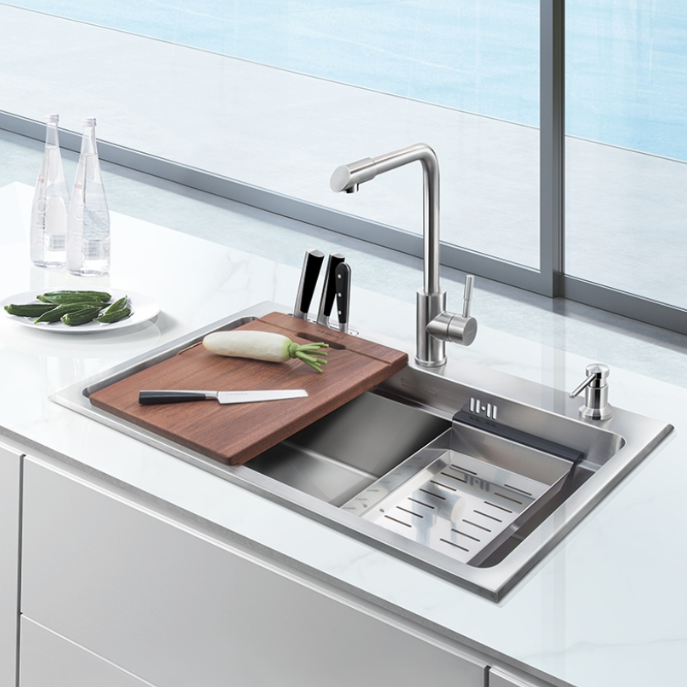
What is the difference between 300 series and 304 stainless steel sinks?
The 300 series stainless steel sink does not refer to a single model, but an alloy series that includes multiple models, and 304 stainless steel sinks are just one of them. There are some differences in alloy composition, mechanical properties and corrosion resistance among 300 series stainless steel sinks. 304 stainless steel sinks are considered the best choice in the 300 series, especially in the field of kitchen equipment and sinks.
1. Corrosion resistance difference
The corrosion resistance of 304 stainless steel sinks is better than that of stainless steel types such as 301 and 302 because 304 stainless steel contains a higher proportion of nickel and chromium. The passivation film formed by these components makes 304 stainless steel resistant to acidic substances, salts in humid environments, and foods and chemicals commonly found in most home and commercial kitchens.
2. Formability and Strength
304 stainless steel sinks have good ductility during processing and can be processed into sinks of different shapes without being easily deformed. In contrast, 301 stainless steel may face greater difficulties during processing due to its higher strength. 303 stainless steel sinks have higher processability due to the addition of sulfur, but their corrosion resistance is poor.
3. Heat resistance
304 stainless steel sinks have higher heat resistance and can withstand higher temperatures without losing performance. Although 301 stainless steel and 302 stainless steel sinks also have good heat resistance, their performance in extremely high temperature environments is slightly inferior to 304 stainless steel.
4. Price
Due to the high cost of raw materials for 304 stainless steel sinks, sinks using 304 stainless steel are usually more expensive. 301 stainless steel and 302 stainless steel are relatively cheaper, but their corrosion resistance and durability are not as good as 304, so they are not suitable for high-standard kitchen environments.
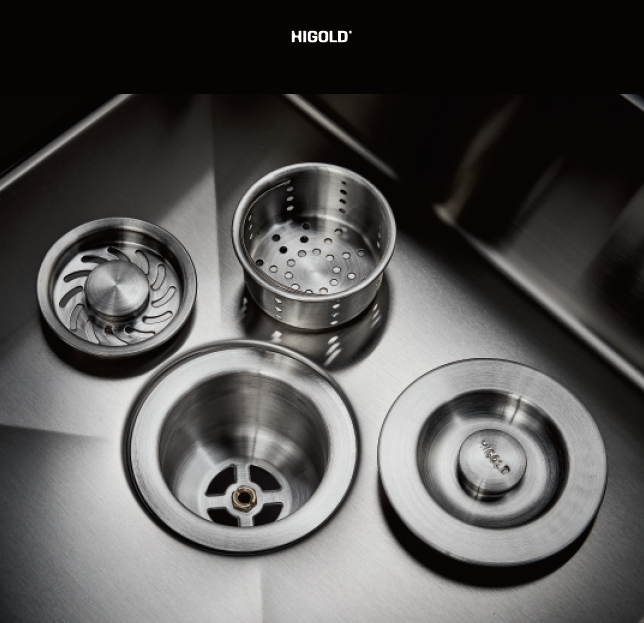
How to choose the right stainless steel sink material for me?
For home kitchens or commercial kitchens, choosing the right stainless steel sink material is crucial. For commercial kitchens that are frequently used and need to withstand grease, acidic substances and long-term high temperature environments, 304 stainless steel is undoubtedly the best choice. Its corrosion resistance, high temperature resistance and strength can meet the use needs of most kitchens.
For small restaurants or kitchens with limited budgets, 301 or 302 stainless steel sinks can also be economical and practical choices. Although their corrosion resistance is not as good as 304 stainless steel, they can still provide a good use experience in some occasions where they are relatively less exposed to corrosive substances.
Top Supplier for Stainless Steel Kitchen Sinks
As a leading manufacturer of high-quality stainless steel Inox sinks, Higold Group offers premium products at affordable prices. With over 7 years of partnership with major global retailers like Costco, our factory guarantees timely deliveries, high-quality standards, and customization options. We offer discounted prices for bulk orders and provide quotes for both small and large-scale purchases. Our sinks are available in various designs and finishes to suit your needs, making us a trusted supplier in the kitchen hardware industry.

